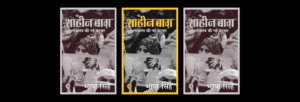Ishmeet Nagpal
From a continuous sit-in at Shaheen Bagh to forming human chains around their fellow male protestors to ward off the police, women are leading the charge of India’s awakening and revolution. Yet, it is still commonplace for various male leaders to use, “Choodiyan pehen lo” (“Go wear bangles”) as a derogatory slur to talk down to other male opponents. The hands of women adorned in bangles, mehndi, smart watches, and FitBits, wielding laptops, cameras, milk bottles, or kitchen utensils, are much stronger than these misogynistic stereotypes.
The unpaid and unsaid labor of women has been glorified on every Women’s Day, deeming them Goddesses and bringers of life, so is India ready to see women who do not want to be put on a pedestal? Is India prepared for women who want their rights, and are willing to fight for them?
Many Indians are quick to dismiss women empowerment with thin arguments like, “Go see the condition of women in Pakistan/Bangladesh and see how empowered Indian women are”. It is easy to take this apparent empowerment for granted, but if Indian women have achieved enough empowerment, why is India still among the most dangerous countries for women? Why is sexual violence so rampant? We are still coming to grips and slowly unraveling the true extent of sexual abuse of women in the Delhi pogrom 2020. The fact that relief materials being collected include emergency contraceptives speaks volumes about the yet to be uncovered cases of sexual violence.
In any war, pogrom, or riot, women and children are adversely affected. As long as women’s bodies and lives are treated as property, as conquest, as spoils of war, we cannot say that we have achieved enough rights for women. Another perspective to consider is what empowerment means to women themselves. It is very succinctly put by Pakistan’s Aurat March slogan “Mera Jism, Meri Marzi” (“My body, My will”).
Our leaders, our family members, and our fellow citizens may have been conditioned by centuries of patriarchy into believing that women are the weaker sex. Maybe this is why slurs and derogatory comments are inherently misogynistic. Yet, this is no excuse to continue perpetuating these notions. Women are fighting an entire regime, putting their bodies in the line of fire, and all you see is a tapestry of bangles, burqas, and bindis that has far greater integrity than any man who stands in the hallowed halls of government passing orders that can and have ruined lives and communities.
This Women’s Day, do away with glorification and condescention. All you need is to open your eyes and look at the women doing everything in their power to RESIST. Multiple women’s protests and sit-ins have erupted all over the country besides Delhi, Mumbai, and Bangalore. Witness their strength and beauty in all its glory.
The message is clear. When you threaten our rights, we will fight, and we will not back down. Our Burqas, Bindis, and Bangles will be the symbols of our protests. These are our lives, our families, our communities, our bodies. Will India accept us without our pedestals?
(Ishmeet Nagpal is a social activist, poet, theatre artist and writer. She writes for SabrangIndia.com.)




